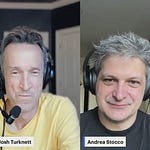We have a question that Tommy is going to address, which comes from Mary in Houston. Mary asks:
As someone who was arguably a heavy drinker but has now quit as a prevention strategy, can your brain recover from years and years of wine overindulgence?
To watch us answer this question, just click on the above video. To listen to it, click on our podcast feed below. To read it, just keep on scrolling…
Episode Transcript
So, this is an interesting question. We know there's research in the sort of smoking literature around recovery of lung function and other tissue changes that can happen after you quit smoking.
And the question here is how much do we have any direct evidence in that regard with respect to the brain, or are we kind of more forced to just conjecture about it? So, I don't know what you have to say, Tommy, but I'm interested to hear if you found anything.
Research on smoking recovery provides insights into how the brain might heal from alcohol use.
Tommy: Yeah, this is a super interesting question. And I kind of took inspiration from the smoking literature for the idea of how to maybe look at this because, like you said, right, if you quit smoking, supposedly within 10 years, your risk of lung cancer is decreased by about 50%. And by 15 years, you essentially have very normal cardiovascular risk compared to other people like you who don't smoke or never smoked.
So the body is very good at repairing itself in general if you remove some kind of chronic toxin, for want of a better word. And we know that at least at high doses, alcohol can be one of those for the brain and other tissues. So the way that I approach this question, I think where we probably have some of the best evidence is in the cognitive function of alcoholics and recovering alcoholics.
Now, I'm not implying this question was asked by an alcoholic, but all the evidence suggests that the effects of alcohol occur on a spectrum. So even if you were never diagnosed or you never had frank alcoholism, you know, somewhere on that continuum might be somebody who still considered themselves a heavy drinker and were drinking more than might be recommended for health-related reasons.
Studies show many alcoholics maintain cognitive function despite their condition.
So there may be some small changes there that kind of occur on this continuum. I will say that the data are interesting because there are some studies in current quote-unquote "high-functioning alcoholics," right? They've never been treated, they meet the criteria for alcohol use disorder. But actually, you know what? By most standards, they seem to be functioning just fine out in the world. And when you do standard cognitive function tests on those individuals, they don't seem to have any significant impairment compared to non-alcohol drinkers.
So then people have said, well, you know, the data that do exist on alcoholics - these are generally individuals that are coming from treatment programs because they're obviously in recovery and they've been, that's been documented for some period of time. And so some differences may be based on other factors like socioeconomic status, demographics. As I'll talk about a little bit later, nutrition plays an important role. So if you're taking a bunch of other boxes and then also drinking a lot at the same time, you know, at least based on some suites of cognitive function tests, you may not have any significant deficits.
Research reveals the relationship between alcohol consumption and brain volume.
However, we have talked previously about the fact that at least when it comes to things like brain volumes, there seems to be a relatively linear effect of alcohol, especially once you get above sort of two units on average per day. And this was in the UK Biobank. So that's two UK units, which is approximately one US unit. But in that lower range up to one unit a day, there doesn't seem to be any major effect on either cognitive function or on brain volumes. And actually, if you squint at the graphs, there may be like non-significantly higher in that drinking-a-little-bit group compared to the no-drinking group. But some of that is healthy user bias. And I think that plays a big role in all of the data that we have available to us.
Specific cognitive functions are affected differently by alcohol use.
So with that said, multiple cognitive impairments or impairment of multiple domains of cognition have been described in alcoholics. But the most consistent ones seem to be visuospatial deficits. So ability to do like spatial reasoning, like complex spatial tasks, impaired short-term memory, and then also some aspects of decreased executive function because the prefrontal or frontal cortex of the brain seems to be particularly susceptible to the effects of alcohol. Some things do seem to be spared. In particular, any knowledge or skills that were acquired prior to alcohol use disorder seem to stick around. So if you did sort of a standard, like, non-verbal IQ test, you would probably perform just about the same. And any memories and other things that come from before that period of time also seem to be spared.
And that's the case for many different scenarios where you lose cognitive function. So when associated with those deficits of cognitive function are brain changes that you can see on MRI. I mentioned that you can see decreases in the volume of both the gray matter and the white matter in the frontal cortex. But it does seem to have a global effect, right? It seems to be affecting neurons and structures throughout the brain. So you're getting involvement in other structures like the hippocampus and areas of the medial temporal lobe. So not just the frontal lobe. And these changes seem to at least partly relate to related cognitive functions, right? So if you think about executive function being largely based in the prefrontal cortex, then that's where related deficits in executive function seem to relate to changes in the prefrontal cortex in alcoholics who seem to be having an effect there.
Research shows the timeline of brain recovery after alcohol cessation.
So then when I think about recovery - like I said, most of the studies that we have available to us are in recovering alcoholics who are in some kind of treatment program so that we know how long they've been abstinent for. Some of the acute effects, say, on some aspects of short-term memory seem to reverse quite quickly, potentially within weeks. Then they've done studies - and I will say that some of these timelines that I'm giving you is just because that's the time at which the researchers did the study. So it's not like this definitely happens in three to four weeks, right? All of this stuff is a continuous recovery process.
But they've found that by three months, some of the cortical volumes start to recover, and then they could do some scans that look at different types of neurotransmission, particularly cholinergic neurotransmission in the prefrontal cortex is really important. For that kind of control of executive function that seems to recover, we're starting to recover by three months at least. Over the next few years, you start to see recovery of blood flow and metabolism again, largely in the prefrontal cortex, but in the regions of the brain that were potentially affected by long-term chronic alcohol use.
And then by seven years - and I think this study did look across a range of years of recovery - by seven years, it seems that most cognitive deficits that may have been there previously have recovered, except for potentially some visuospatial reasoning. So they do tests where you have, like, blocks and a pattern, and you have to kind of organize them to replicate a pattern. That was like one of the tests that they did.
Age and lifestyle factors influence the brain's recovery potential.
So if we then think about what might affect recovery, and there are some papers that look at this - one is age, and the older the individual, the either slower or the less likely they are to recover from the effects of alcohol. And I think part of this could be related to the processes of aging, but equally, you know, we could also say that like we've talked about several times in the past, that as we get older, we just use our brains differently. And maybe older individuals just aren't stimulating the recovery processes in the same way. So probably a little bit of both.
For example, you might imagine that if you're worried about visuospatial function or reasoning, you could definitely do some complex visual tasks. You could take up pickleball or play some complex computer games or something like that that's training those aspects of your brain. And we would expect some additional recovery in that area. And so everything that we're talking about here is spontaneous recovery. We're not talking about trying to retrain or actively recover these processes. So I think there's a whole bunch of stuff that we normally talk about in terms of how you support cognitive function and skill development that would absolutely play a role here and probably augment and improve some of these recovery processes.
Nutrition plays a critical role in brain health and recovery from alcohol use.
So then an important one in that area is going to be nutrition. One of the most common or at least talked about cognitive deficits that we see in alcoholics is Korsakoff syndrome, which is associated with depression, certain types of amnesia, and then confabulations to try and make up those gaps in memory. And that's particularly related to B vitamins or B vitamin deficiencies like B1, which is thiamine. And so I think part of the reason why we may see cognitive deficits in alcoholics is because in general, alcoholics tend to take less care about what they eat and maybe even eat less in total.
So some of this is probably confounded by nutritional status and nutritional quality, which is something that you can actively overcome if you're working on that. So I think that's an area where there's a big scope for improvement. And then multiple other aspects of physical health are going to play a role here. You know, we just had an episode on high-intensity interval training and how that can support certain aspects of cognitive function.
Animal studies provide evidence for brain regeneration after alcohol cessation.
So I think that was pretty much everything I had. It certainly seems like recovery is largely possible and most of it occurs spontaneously. There's probably big scope for greater recovery and/or mitigating any potential effects. If they did occur, which they may not have, if some of those other things were in place, like we mentioned earlier, if there were any deficits that occurred or issues that occurred, I think most of that is recoverable.
I didn't talk about animal studies. There are lots of rat studies where they show that if they make them alcoholics or they have them drink steadily and then they make them abstinent, you start to see neurogenesis - you know, active recovery of neurons and regrowth of these areas of the brain. That's difficult to study in humans. And also what we see in rats may not exactly be what happens in humans, but certainly a lot of supporting evidence from animal studies as well that you essentially actively regrow certain parts of the brain where that's possible after chronic alcohol use.
Research suggests moderate alcohol consumption may not harm cognitive function.
The final part I will say is that there's still a fairly consistent signal across most of the literature that suggests that at least very low-level alcohol intake is either not associated with impairments or may be associated with better cognitive function or better overall health. There's some debate as to whether this is driven by healthy user bias. So people who drink small amounts tend to be healthier than those who drink lots and those who drink nothing at all. But there is some mechanistic data to suggest that alcohol may have sort of like a hormetic type effect on multiple systems in the body. So again, small doses but not high doses chronically may improve overall health and function.
This is not me saying that you should go out and start drinking if you're not drinking, but it's just this is kind of an active part of the literature. And related to that, I have a large dataset that I have access to through Food for the Brain, which is a dementia prevention charity in the UK, and they have sort of 25,000 individuals who did a standardized cognitive function test and then also answered hundreds of different questions about lifestyle.
And those who were sort of drinking at or around the UK maximum recommended limit of alcohol were the ones who performed on average best in terms of cognitive function. Again, I think a lot of this is driven by socioeconomic status and other factors. And this is a group of individuals who are actively interested in their cognition and engaging in a test through a charity that talks about nutrition and cognitive function. So it's a very specific group of people.
Overall health and lifestyle factors may matter more than alcohol consumption alone.
But I think we can at least say that in the setting of that kind of interest, people who are actively working on improving their cognitive function, you know, small amounts of alcohol don't seem to be detrimental. That's kind of what I'm trying to say. That doesn't mean that they are actively beneficial and you should go out and change your drinking habits in that direction because of it.
But there's lots of moving parts. I think the general principles that we talk about in terms of physical health, environment, lifestyle, cognitive engagement - all of those are probably going to play a bigger role in terms of long-term cognitive function than alcohol intake. And if you previously were a heavy drinker and are now abstaining - and of course we have to appreciate that not everybody is able to drink just a small amount, right? This is why abstinence exists and is important for a lot of people. If that is the case, I think recovery certainly seems to be possible, if not very likely, if all those other aspects are put into place.
So, that was what I could find. Josh, any thoughts, comments, or questions following up from that?
Josh: Quick question - what would be considered a small amount in the context of the research?
Tommy: Yeah, so, I think it's up to one UK unit a day. That's kind of where I think if there is any signal that there's benefit, or at least no clear signal of a detrimental effect either on function or structure of the brain, it's in that area, like zero to one units a day. And that is the equivalent of like 25 mils, which is just under a fluid ounce of some kind of spirit. And then half a pint of 4 percent beer or a very small glass of 12 percent wine, like 100 mils. So it's not very much.
And then sort of a standard pint of beer in the UK is technically two units. 175 mils of wine is two units. So once you're drinking that much every day, I think you're starting to see a potential for a detrimental effect, at least on brain structure, even if not measurable in terms of cognitive function at the time.
Josh: What if you just get all of that once a year?
Tommy: Once a year would be tricky. Like some people might ask about it once a week or spread out throughout the week. So maybe a more reasonable approach would be a glass of wine every few nights.
Josh: Would you speculate that that's fairly analogous?
Tommy: Yeah. But you have to speculate because most of these studies just aggregate large amounts of data, or they phrase the question in a way that will apply to the widest group of people. So it's very difficult to compare somebody who drinks half a glass of wine every night to somebody who drinks a glass of wine every other night. We kind of just have to average over time. But I imagine it's probably fairly similar.
Josh: Yeah. It gets to whether or not how much of it's just the chronicity and how much of it relates to going above some threshold and the acute impact of that.
Tommy: I think everything I've found suggests that there probably isn't much of a threshold. It all seems to be relatively linear. Even if we look at brain structure, brain function, subjective versus objective cognitive deficits, it all seems to occur on a spectrum.
Poor nutrition from alcohol consumption may significantly impact brain health.
Josh: You mentioned the nutritional consequences are some of the most significant for the brain. It's kind of analogous to, you know, a diet that's heavy in highly processed carbohydrates, right? If you're getting a lot of your calories from alcohol or if you're getting a lot of your calories from just simple sugars, there's just not that much room for nutrient-rich foods in your diet. So it's hard to get enough.
And all this also brings up the challenge of the fact that a lot of the cognitive issues may be more functional in nature, not something you're going to see structurally on a scan or something like that. And those may be the things that are reversing more quickly.
One other question was, so you mentioned that there's clearly a spectrum in terms of how much a given individual is impacted by alcohol. And you mentioned there are differences likely in lifestyle, socioeconomic status, and so forth that may explain some of that. Were there any specific studies that looked at the moderating factors amongst those who are more impacted at the same level of consumption than those who weren't?
Tommy: Not quite in that way. But I think part of it, you know, part of what seemed to play a role here was like previous experiences or previous mental health issues that may have preceded a period of alcoholism. So, like what you're mentioning, some of these other functional effects may be more related to, say, emotional regulation, and that's often not measured in these standard cognitive function tests.
Obviously drinking particularly regularly and at a high amount high amounts affects sleep, which sort of affects pretty much every aspect of cognitive function. But what it did, what did seem to be evident from the literature was that those who had when they were talking, especially around emotional regulation or, or, or, or deficits in that area then.
If you had issues with those before that, or, you know, if you had any any mental health problems prior to alcoholism, those seem to be exacerbated, or you're a higher risk of that getting worse once, you know, when you were, when you had alcohol use disorder. So, we know that like for instance depression and alcohol have this bi directional relationship. So those who are depressed are more likely to become alcoholics, but drinking alcohol can also exacerbate depression. So I think some of this is probably related to pre morbid. If we, if the morbidity is alcohol use disorder, pre morbid state probably, probably some of this is an exacerbation of, of maybe issues that existed beforehand.
Overall health status determines alcohol's impact on brain structure and function.
Yeah, it certainly seems that, you know, your just general health overall and lifestyle is going to have a significant impact on what, how, how much it A given level of alcohol is going to affect, affect you structurally and so forth. You know, one very relevant example of why you know, structural imaging can't tell us the whole story is, you can be completely intoxicated from alcohol and you're going to have a normal MRI scan, so clearly a compromised cognitive function. But so the tissue does not tell the whole story. That's that's the message we try to get out.
Josh: All right. Well, great question. Interesting topic. I think all, all in all encouraging. I think bottom line is, you know regardless of how much evidence we have at this point in time, doing what we can to stimulate repair and recovery and support those processes is going to be, it's going to be the top priority if you have any, that in your history.
Stress about past alcohol use may be more harmful than the drinking itself.
Yeah, and there was one other thing that I was, I meant to bring up and this question was actually asked in the context of a longer response related to ApoE4 and the recent the recent episode we did on that. And I think part of what we need to be mindful of is the stress associated with thinking that we're at higher risk.
So if somebody, you know, we talked about what we think is, was probably quite irresponsible in that, in the context of the Apple E4 paper, the stress you're going to, you're going to generate in individuals who are Apple E4 carriers. And that stress is probably going to have a greater detrimental effect on cognitive function. That or at least a significant effect in addition to any effect over the genotype itself. And so I think this is relevant here as well.
Whatever's happened in the past, we have no control over it anymore. So, so if you are somebody who is a heavy drinker and because of you know, fairly popular messaging out now in the health space, which is that like alcohol is a toxin and as soon as any passes your lips, you're going to be doing like terrible damage to your body. I don't think we have strong evidence for that level of messaging, but people who listen to that are going to internalize that and say, all these terrible things I did to myself and now I'm at higher risk of dementia and cardiovascular disease. And that stress associated with thinking about that, I think is probably going to have more of a detrimental effect than, than, than some of those you know, issues themselves.
The path forward focuses on positive actions rather than past behaviors.
So I think part of what we should getting across here is that regardless of what happened in the past, there is a huge amount that you can do now to, you know, mitigate anything that did happen and or, you know, continue to support and enhance cognitive function now and in the future.
Yeah, remember that most things in health and biology exist on a spectrum and aren't binary.
Thanks again to Mary for that question. If anyone else has questions related to this topic or anything else about brain health and fitness, send them our way at brainjo.academy/questions.












